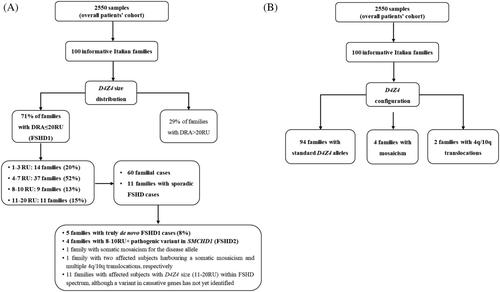当前位置:
X-MOL 学术
›
Clin. Genet.
›
论文详情
Our official English website, www.x-mol.net, welcomes your feedback! (Note: you will need to create a separate account there.)
Characterization of D4Z4 alleles and assessment of de novo cases in Facioscapulohumeral dystrophy (FSHD) in a cohort of Italian families
Clinical Genetics ( IF 3.5 ) Pub Date : 2023-12-02 , DOI: 10.1111/cge.14466 Claudia Strafella 1 , Luca Colantoni 1 , Domenica Megalizzi 1 , Giulia Trastulli 1 , Emma Proietti Piorgo 1 , Guido Primiano 2 , Cristina Sancricca 2 , Giulia Ricci 3 , Gabriele Siciliano 3 , Carlo Caltagirone 4 , Massimiliano Filosto 5 , Giorgio Tasca 6 , Enzo Ricci 7, 8 , Raffaella Cascella 1, 9 , Emiliano Giardina 1, 10
Clinical Genetics ( IF 3.5 ) Pub Date : 2023-12-02 , DOI: 10.1111/cge.14466 Claudia Strafella 1 , Luca Colantoni 1 , Domenica Megalizzi 1 , Giulia Trastulli 1 , Emma Proietti Piorgo 1 , Guido Primiano 2 , Cristina Sancricca 2 , Giulia Ricci 3 , Gabriele Siciliano 3 , Carlo Caltagirone 4 , Massimiliano Filosto 5 , Giorgio Tasca 6 , Enzo Ricci 7, 8 , Raffaella Cascella 1, 9 , Emiliano Giardina 1, 10
Affiliation

|
Facioscapulohumeral dystrophy (FSHD) is an autosomal dominant disease, although 10%–30% of cases are sporadic. However, this percentage may include truly de novo patients (carrying a reduced D4Z4 allele that is not present in either of the parents) and patients with apparently sporadic disease resulting from mosaicism, non-penetrance, or complex genetic situations in either patients or parents. In this study, we characterized the D4Z4 Reduced Alleles (DRA) and evaluated the frequency of truly de novo cases in FSHD1 in a cohort of DNA samples received consecutively for FSHD-diagnostic from 100 Italian families. The D4Z4 testing revealed that 60 families reported a DRA compatible with FSHD1 (1–10 RU). The DRA co-segregated with the disease in most cases. Five families with truly de novo cases were identified, suggesting that this condition may be slightly lower (8%) than previously reported. In addition, D4Z4 characterization in the investigated families showed 4% of mosaic cases and 2% with translocations. This study further highlighted the importance of performing family studies for clarifying apparently sporadic FSHD cases, with significant implications for genetic counseling, diagnosis, clinical management, and procreative choices for patients and families.
中文翻译:

一组意大利家庭中面肩肱营养不良 (FSHD) 的 D4Z4 等位基因的特征和新发病例的评估
面肩肱营养不良 (FSHD) 是一种常染色体显性遗传疾病,尽管 10%–30% 的病例是散发性的。然而,这一百分比可能包括真正的新发患者(携带双亲均不存在的减少的D4Z4等位基因)以及因患者或双亲中嵌合体、非外显性或复杂遗传情况而导致的明显散发性疾病的患者。在这项研究中,我们对D4Z4减少等位基因 (DRA) 进行了表征,并评估了从 100 个意大利家庭连续收到用于 FSHD 诊断的一组 DNA 样本中 FSHD1 真正新发病例的频率。D4Z4测试显示,60 个家庭报告了与FSHD1 (1-10 RU) 兼容的 DRA。在大多数情况下,DRA 与疾病共同分离。确定了五个真正出现新发病例的家庭,表明这种情况可能略低于之前报道的情况(8%)。此外,所调查的家族中的D4Z4特征显示 4% 为嵌合病例,2% 为易位。这项研究进一步强调了进行家庭研究对于澄清明显散发的 FSHD 病例的重要性,这对患者和家庭的遗传咨询、诊断、临床管理和生育选择具有重大意义。
更新日期:2023-12-04
中文翻译:

一组意大利家庭中面肩肱营养不良 (FSHD) 的 D4Z4 等位基因的特征和新发病例的评估
面肩肱营养不良 (FSHD) 是一种常染色体显性遗传疾病,尽管 10%–30% 的病例是散发性的。然而,这一百分比可能包括真正的新发患者(携带双亲均不存在的减少的D4Z4等位基因)以及因患者或双亲中嵌合体、非外显性或复杂遗传情况而导致的明显散发性疾病的患者。在这项研究中,我们对D4Z4减少等位基因 (DRA) 进行了表征,并评估了从 100 个意大利家庭连续收到用于 FSHD 诊断的一组 DNA 样本中 FSHD1 真正新发病例的频率。D4Z4测试显示,60 个家庭报告了与FSHD1 (1-10 RU) 兼容的 DRA。在大多数情况下,DRA 与疾病共同分离。确定了五个真正出现新发病例的家庭,表明这种情况可能略低于之前报道的情况(8%)。此外,所调查的家族中的D4Z4特征显示 4% 为嵌合病例,2% 为易位。这项研究进一步强调了进行家庭研究对于澄清明显散发的 FSHD 病例的重要性,这对患者和家庭的遗传咨询、诊断、临床管理和生育选择具有重大意义。



























 京公网安备 11010802027423号
京公网安备 11010802027423号